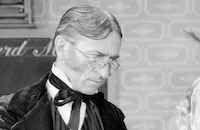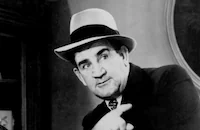Blondie Johnson

Brief Synopsis
Cast & Crew
Ray Enright
Joan Blondell
Chester Morris
Allen Jenkins
Earle Foxe
Claire Dodd
Film Details
Technical Specs

Synopsis
When poverty kills Blondie Johnson's mother, Blondie vows that she will never be poor again. Convinced that virtue doesn't pay, she travels to the city and immediately invents a con with the help of taxi driver Red Charley. Later that evening, after splitting the take with Red, one of her marks, Danny Jones, spots her and invites her home with him for a talk. When she hesitates, he tells her that he is the right hand man of Max Wagner, the head racketeer in town. With Blondie's brains and Danny's connections, they move to take over Max's territory. Danny falls in love with Blondie, but she prefers to keep their arrangement strictly business. Max tries to eliminate the competition by running over Danny with a car, but Danny lives. Now Max must be killed, and Louis, one of the gang, has him shot. Now that they are in power, Danny and Blondie fight over his excessive spending, and Blondie vows to ruin him. She takes over the gang and is extremely successful. When Louis is arrested for Max's murder, the gang believes that Danny talked. Reluctantly, Blondie approves Danny's murder, but when she finds out that he had nothing to do with Louis' arrest, she rushes off to stop the shooting. She is too late, but Danny is not dead. After he recovers, they are both tried and sentenced to jail, but agree that they lived the wrong way and that after they pay their dues, they will marry and try to go straight.

Director
Ray Enright
Cast

Joan Blondell

Chester Morris

Allen Jenkins
Earle Foxe

Claire Dodd

Mae Busch

Joe Cawthorne

Olin Howland

Sterling Holloway
Toshia Mori
Arthur Vinton
Donald Kirke

Tom Kennedy
Sam Godfrey
Crew

Photo Collections
Videos
Movie Clip




Trailer
Film Details
Technical Specs

Articles
Blondie Johnson - Blonde Johnson
Blondie Johnson marked Blondell's first solo starring part at Warners, where she had signed on in 1930. The role of Blondie was created with her in mind by screenwriter Earl Baldwin. The film was later seen as an important milepost in its depiction of a tough, independent woman who doesn't depend on men to make her way in the world. "I play a feminine Little Caesar," Blondell remarked at the time.
Director Enright understood how to make the most of the new star's appeal, summed up by film historian David Shipman as the combination of "reliability and versatility with an overall attractive personality: to anyone believing that professionalism is the greatest of show business virtues it is difficult to over praise her." Blondell sustained that professionalism through more than 90 movies, evolving from a favorite in madcap Busby Berkeley musicals to an Oscar-nominated character actress.
Director: Ray Enright
Screenplay: Earl Baldwin
Art Direction: Esdras Hartley
Cinematography: Tony Gaudio
Costume Design: Orry-Kelly
Editing: George Marks
Principal Cast: Joan Blondell (Blondie Johnson), Chester Morris (Danny), Allen Jenkins (Louis), Earle Foxe (Scannel), Claire Dodd (Gladys), Mae Busch (Mae), Sterling Holloway (Red).
BW-68m.
by Roger Fristoe

Blondie Johnson - Blonde Johnson
Quotes
Trivia
Notes
The film was shot over 25 days for a total budget of $151,000, according to production records included in the file on the film in the AMPAS Library.















